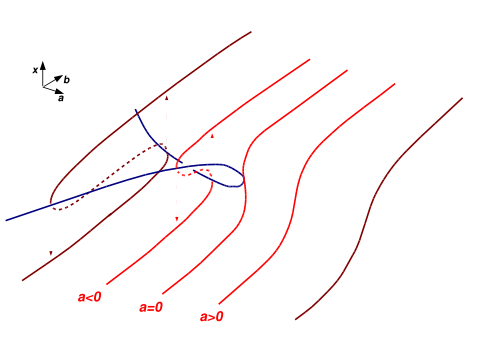 Catastrophe theory is a way of modeling sudden changes mathematically: I am not suggesting we are heading for a catastrophe in the ordinary sense. So, I found Politics in Latin America, A Catastrophe Theory Model, while reflecting on the theory and its application to today’s financial and political systems. Access to the article is expensive, but the abstract is interesting:
Catastrophe theory is a way of modeling sudden changes mathematically: I am not suggesting we are heading for a catastrophe in the ordinary sense. So, I found Politics in Latin America, A Catastrophe Theory Model, while reflecting on the theory and its application to today’s financial and political systems. Access to the article is expensive, but the abstract is interesting:
This article develops and tests a model of the socioeconomic origins of political change and development by means of an in-depth analysis of the contemporary political history of fifteen Latin American countries. The analysis uses the logical structure of catastrophe theory in order to incorporate the discontinuous changes that are so prevalent in political development. The model is used to determine some of the conditions for the emergence of political polarization, political instability, and authoritarian regimes. The conclusions are that catastrophe theory does provide a useful framework for analyzing political change in Third World countries and that to maintain a stable polyarchy requires a relatively specific combination of political participation, distribution of income, and levels of education.
Interesting stuff and the authors are far from alone in applying these ideas to politics: see also Day and Letts, which is concerned with the overarching ideas of complexity theory:
[Complexity] is about ‘adaptability’ and the capacity to become aware that circumstances have changed and to produce new solutions. Not only that, it is also true that this ability to produce innovation and change will drive circumstances of others and drive evolution itself… (1994: 584). Rather than passively responding to events, complex systems interact with their environment. Indeed, complexity is characteristically found in systems that are able to exist at the boundary between order and chaos and to strike a balance between these two regimes that is never quite stable and yet never quite turbulent (Hayles, 1991:13-14; Prigogine, 1984:115-117; Waldrop, 1992:11-12, 293). As Waldrop has described it, “the edge of chaos is the constantly shifting battle zone between stagnation and anarchy, the one place where complex systems can be spontaneous, adaptive, and alive” (1992:12). … Thus, while complexity theory deconstructs the modernist notion that complete knowledge and total control are possible, it also positions itself as a true and totalizing theory. This flaw might be fatal, but seems less so if the terms of description are inverted. We would prefer to say that if complexity theory asserts something like a totality, it is a totality of difference and ambiguity; if complexity is a theory of unity and objectivity, it is simultaneously a theory of fragmentation and relativism.
Which amounts, I think, to the beginnings of a scientific argument for liberal Conservatism as a postmodern, yet natural, way to govern successfully and to progress beyond New Labour’s modernist centralised control. Let’s hope for that sudden change of government.